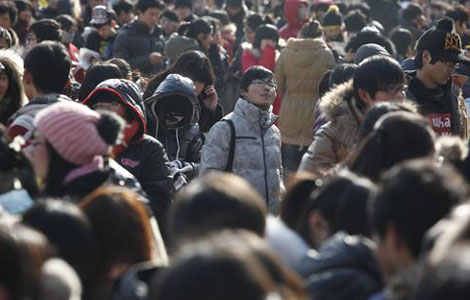Beijing to set up PM2.5 monitoring stations
Updated: 2012-02-01 16:58
By Zheng Xin (chinadaily.com.cn)
|
|||||||||||
BEIJING– The capital will set up more than 30 fine particulate pollutant monitoring stations to inform the public of the air quality by the end of this year, according to the city's environmental protection bureau.
Six of the more than 30 PM2.5 (particulate matter smaller than 2.5 micrometers in diameter) monitoring stations will be set up soon in both downtown as well as surrounding suburbs, based on existing facilities, the Beijing Municipal Environmental Protection Bureau said on Feb 1.
Yu Jianhua, director of the air pollution control division of the bureau, said the bureau would carefully choose the locations of the stations, in order to represent the city's air condition comprehensively and objectively. "The stations will be set up through all 16 districts and counties in the city," said Yu.
Many residents are concerned with where the stations will be located and whether they can accurately reflect the city's air quality. "Hopefully the stations will not be located close to any water reservoirs or forest park," said Wang Yu, 26, a Beijing resident. "That would simply be a waste of money for the tax payers."
Some non-governmental organizations (NGOs) on environmental protection also appealed to the government to set up stations where air quality can be provided.
"The monitoring station will be nothing but a decoration if it cannot reflect objectively an area's air pollution and contamination," said Wang Qiuxia, a researcher at Green Beagle, an environmental protection NGO based in Beijing.
The bureau said the capital would place the stations in accordance with the general international practice. "The station should be located selectively, neither around the most clean nor polluted areas," said Yu.
Yu said that according to the national standard, the location should be 50 meters away from the pollution source, including automobile exhaust by the roadside.
The US embassy's rooftop air quality monitor is only 15 meters from the road, which might detect a higher figure of Air Pollution Index, Yu said.
The bureau said it plans to purchase facilities from home and abroad in the near future and step up the training of inspection personnel.
The government plans to add another 200,000 mu (3,3000 acres)of forest planting in 2012, mainly in urban areas, freeways and arterial roads, to improve the capital's air quality and reach the stricter standard of PM2.5 concentration laid down by the Ministry of Environmental Protection at the end of last year.
Forestplanting, together with better oil quality and scrapping old and polluting automobiles, would greatly help improve the city's air quality, said the bureau.
According to the ministry's new standard, which is to be adopted nationwide by 2016, the average yearly ceiling for PM2.5, which is for the first time included as a detected pollutant, is set at 35 micrograms per cubic meter, while the daily limit is at 75.
Hot Topics
Kim Jong-il, Mengniu, train crash probe, Vaclav Havel, New Year, coast guard death, Internet security, Mekong River, Strait of Hormuz, economic work conference
Editor's Picks

|

|

|

|

|

|







